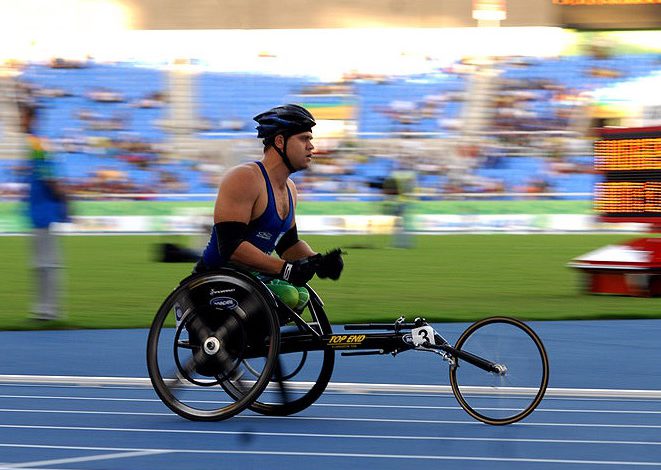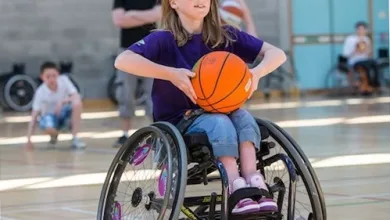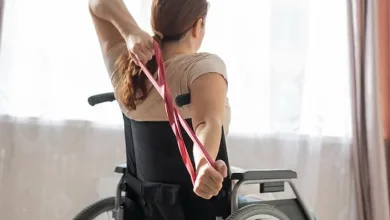Top 20 Wheelchair Sports for Adults to Try

Table of Contents
Top 20 Wheelchair Sports for Adults to Try
Wheelchair Sports for Adults: Reimagine Fitness and Fun
Imagine carving down a racetrack on a sleek handcycle, feeling the wind whip through your hair as you push your limits. Or picture the thrill of executing a perfect basket in a fast-paced wheelchair basketball game. These are just a taste of the incredible possibilities that await you in the vibrant world of wheelchair sports for adults.
While traditional sports may seem inaccessible, a whole universe of exciting and rewarding athletic activities is specifically designed for individuals who use wheelchairs. Whether you’re a seasoned athlete seeking a new challenge or a complete beginner looking for a fun way to get active, wheelchair sports offer something for everyone.
Beyond the Finish Line: The Benefits of Wheelchair Sports
The advantages of wheelchair sports extend far beyond the thrill of competition. Here are some compelling reasons to lace up and join the game:
- Physical Fitness: Wheelchair sports provide a fantastic workout, promoting cardiovascular health, building muscle strength, and improving overall endurance and coordination.
- Mental and Emotional Well-being: Physical activity releases endorphins, natural mood elevators that combat stress and anxiety, leaving you energized and positive.
- Social Connection: Wheelchair sports offer a unique opportunity to build friendships, connect with a supportive community of fellow athletes, and combat feelings of isolation.
- Empowerment and Confidence: Overcoming physical challenges and pushing your athletic limits fosters a sense of accomplishment and self-belief.
- Improved Quality of Life: Wheelchair sports can significantly enhance your overall well-being, leading to a more fulfilling and active life.
Finding Your Perfect Fit: Getting Started with Wheelchair Sports
Taking the first step towards participating in wheelchair sports can be daunting, but it’s an enriching journey. Here are some helpful tips to get you started:
- Explore Your Options: Research different sports to find one that piques your interest. Talk to other wheelchair athletes, attend local adaptive sports events, or browse online resources for inspiration.
- Connect with Local Programs: Many communities offer adaptive sports programs with introductory classes, equipment rentals, and guidance for beginners.
- Seek Guidance from Professionals: Consult with a physical or occupational therapist to assess your fitness level and recommend suitable sports based on your abilities.
- Start Small, Dream Big: Don’t be afraid to begin with basic exercises or introductory classes. Gradually increase the intensity and duration of your workouts as you gain confidence and improve your skills.
Remember, the most important thing is to have fun and enjoy the process!
Dive into the Thrill: Details on the Top 20 Wheelchair Sports for Adults
Get ready to unleash your inner athlete! Here’s a closer look at the “Top 20 Best Wheelchair Sports for Adults,” each bursting with unique challenges and exhilarating possibilities:
Classic Team Sports:

1. Wheelchair Basketball: Imagine the crowd’s roar as you manoeuvre your specially designed wheelchair across the court, dribbling with lightning speed and aiming for a basket. Teamwork and strategic plays are essential in this fast-paced game, replicating the intensity and excitement of traditional basketball.

2. Wheelchair Rugby: Channel your inner warrior in this high-octane, full-contact sport. Strategize with your teammates, navigate obstacles on the court, and use your upper body strength to push through the opposing team and score tries. Think rugby meets dodgeball with a touch of exhilarating physical challenge.
3. Wheelchair Soccer: Calling all soccer fans! Get ready to showcase your footwork skills (yes, soccer balls can be kicked with specially designed wheels) on the field. Experience the thrill of competition, strategize with your teammates, and feel the rush of scoring a goal.
4. Wheelchair Volleyball is a dynamic sport that offers a unique twist on the classic game. You serve, spike, and bump the volleyball with your teammates, using a combination of upper body strength, agility, and strategic positioning to dominate the court.
5. Sitting Volleyball: Enjoy the competitive spirit of volleyball while remaining seated. This fast-paced game requires excellent hand-eye coordination and teamwork, making it a fantastic option for those seeking a fun and challenging activity emphasizing collaboration and strategy.
Stay tuned for the next section, where we explore the exhilarating world of Fast-Paced Thrills, precision, and Focus Sports!
Fast-Paced Thrills: Unleash Your Inner Speed Demon

Get ready to feel the wind in your hair and the adrenaline pumping through your veins as we delve into the world of Fast-Paced Wheelchair Sports:
6. Wheelchair Racing: Experience the pure exhilaration of speed as you push your limits on the racetrack. Imagine carving down a smooth surface, feeling the rush of air as you propel yourself forward with powerful arm strokes. Whether you compete on a track or an open road, wheelchair racing challenges athletes of all levels.

7. Handcycling: Embrace the freedom of the open road with handcycling. Imagine exploring scenic trails, feeling the sun on your face, and experiencing the thrill of speed on dedicated cycling tracks. Handcycles are three-wheeled bikes propelled by hand cranks, offering a unique and exhilarating way to explore the outdoors and get a fantastic workout.
8. Track Cycling: Put your athletic prowess to the test on the Velodrome, a specially designed track for cycling competitions. Track cycling offers a unique blend of speed, strategy, and teamwork (in team relay races). Hone your technique, master the art of maintaining speed on banked curves, and feel the rush of pushing your limits on this thrilling racetrack.
9. Wheelchair Motocross (WCMX): Calling all adrenaline junkies! Are you ready for the ultimate challenge? WCMX takes wheelchair sports to a whole new level. Navigate ramps, jumps, and obstacles on a specially designed wheelchair, pushing your skills and courage to the limit. This sport requires focus, control, and a healthy dose of bravery – perfect for those who crave an electrifying experience.
10. Wheelchair Curling: Imagine a strategic blend of precision and focus on a winter wonderland. Wheelchair curling allows you to showcase your tactical thinking and finesse as you launch specially designed stones across the ice, aiming for the perfect placement to outscore your opponent. Glide gracefully on the ice, strategize with your teammates, and feel the satisfaction of a perfectly executed shot.
Sharpen Your Focus: Precision and Focus Sports Await
Now, let’s shift gears and explore the world of Precision and Focus Sports, where concentration and strategy reign supreme:
11. Wheelchair Tennis: Challenge yourself on the court with wheelchair tennis. This dynamic sport requires strategic thinking, exceptional hand-eye coordination, and powerful strokes to dominate your opponent. Master the art of forehands, backhands, and volleys, all from a seated position, experiencing the thrill of competition and the satisfaction of a well-placed shot.

12. Wheelchair Table Tennis: Get ready for a fast-paced battle of reflexes and strategy! Wheelchair table tennis offers an exhilarating experience similar to traditional table tennis but from a seated position. Hone your reflexes and reaction times as you battle for control of the ping pong ball, volleying it back and forth with lightning speed and precision.
13. Boccia: Unleash your inner strategist in this Boccia match. This Paralympic sport requires precise throws and tactical positioning to out-manoeuvre your opponent’s balls and secure the most points. Imagine a bocce court where you strategically roll or throw specially designed balls, aiming for the target area and strategically blocking your opponent’s advances – a perfect blend of focus and planning.
14. Showdown (Blind Tennis): Uniquely experience the thrill of tennis. Showdown utilizes a silent ball with bells, allowing visually impaired individuals to enjoy the competitive spirit of the sport. Sharpen your auditory senses, strategize with your partner, and experience the excitement of tracking the ball and executing well-placed shots based on sound cues.
15. Goalball: This dynamic sport is specifically designed for visually impaired athletes. Sharpen your auditory senses and teamwork skills as you strategize to score goals by throwing a ball with bells past the opposing team’s defenders. Imagine a fast-paced game where communication and coordination are essential, relying on sound cues to locate the ball and work with your teammates to score.
Individual Pursuits: Chart Your Own Course

Now, let’s explore the world of Individual Pursuits, where you can challenge yourself and experience the joy of movement at your own pace:
16. Swimming: Enjoy a refreshing workout and improve your cardiovascular health with swimming. The water provides a low-impact environment, making it suitable for all fitness levels. Glide effortlessly through the water, performing strokes that build strength and endurance, or enjoy the serenity of a relaxing swim.
17. Archery: This rewarding sport tests your focus and accuracy. Feel the satisfaction of hitting the target and hone your mental concentration. Imagine carefully aiming a specially designed bow and arrow, mastering the art of breath control and focus to send the arrow flying towards the target.

18. Powerlifting: This sport allows you to showcase your upper body strength and determination while building incredible strength and pushing your physical limits. Imagine lifting weights designed for wheelchair users, pushing your limits, and conquering new strength goals.
19. Rock Climbing: Conquer new heights and challenge yourself with rock climbing. Specially adapted climbing walls and supportive equipment make this exhilarating activity accessible to wheelchair users. Imagine scaling a climbing wall, strategizing your moves, and experiencing the thrill of reaching the top, all with the support of specially designed equipment.
20. Yoga: Find inner peace and improve your flexibility with yoga. Yoga offers a fantastic way to unwind, improve core strength, and enhance overall well-being. Imagine flowing through a series of yoga poses adapted for a seated position, focusing on your breath and movement to achieve a sense of calm and relaxation.
Remember, this is just a glimpse into the exciting world of wheelchair sports! Countless other options are waiting to be explored. So, why wait? Take the first step today, discover your perfect sport, and embark on a physical and mental empowerment journey.
Convincing You Further: Pros and Cons Chart
While wheelchair sports offer many benefits, it’s important to consider all aspects before diving in. Here’s a breakdown of some pros and cons to help you make an informed decision:
| Pros | Cons |
| Improved Physical Fitness: Builds strength, endurance, and cardiovascular health. | Initial Investment: Specialized equipment might require an initial investment. |
| Mental and Emotional Well-being: Boosts mood, reduces stress, and fosters confidence. | Time Commitment: Regular practice is necessary to see significant results. |
| Social Connection: Offers opportunities to meet new people and build friendships. | Finding the Right Sport: Exploring different options may take some time. |
| Sense of Accomplishment: Overcoming challenges fosters self-belief and a sense of achievement. | Accessibility: Not all facilities might be fully accessible. |
| Fun and Enjoyable: Provides a fun and engaging way to stay active. | Safety Precautions: Learning proper techniques is crucial to minimize injury risk. |
Remember, the pros far outweigh the cons! With some planning and research, you can overcome obstacles and find a wheelchair sport that perfectly aligns with your interests and abilities.
Reference Organizations Involved in Wheelchair Sports:
Here are some excellent reference organizations involved in wheelchair sports, each offering valuable services to support your journey:
- National Wheelchair Basketball Association (NWBA):https://www.nwba.org/
- Services: The NWBA is the governing body for competitive wheelchair basketball in the United States. It offers resources for finding local programs, participating in leagues and tournaments, and becoming a wheelchair basketball athlete.
- The Adaptive Sports Association (ASA):https://asadurango.com/
- Services: The ASA is a non-profit organization that provides opportunities for individuals with disabilities to participate in sports and recreational activities. They offer a searchable database of adaptive sports programs across the US, information on different sports, and resources for athletes and families.
- Move United:https://moveunitedsport.org/
- Services: Move United is a national organization that promotes health, wellness, and independence for people with disabilities through sports and physical activity programs. It offers online resources, including instructional videos and guides for various wheelchair sports and information on finding local programs and events.
- Christopher & Dana Reeve Foundation:https://www.christopherreeve.org/
- Services: The Christopher & Dana Reeve Foundation is a leading organization for spinal cord injury solutions. While not solely focused on sports, it offers resources on health and wellness for individuals with spinal cord injuries, which can be helpful for athletes. Additionally, it might provide information on grant programs or scholarships that could be used to offset the cost of participating in wheelchair sports.
- National Disability Rights Network (NDRN):https://www.ndrn.org/
- Services: The NDRN is a national advocacy organization that works to protect and advance the rights of people with disabilities. While not directly involved in sports programs, they can be a valuable resource for information on disability rights and advocacy, which can be helpful for individuals navigating the world of wheelchair sports and ensuring equal access to opportunities.
- The Paralyzed Veterans of America (PVA):https://pva.org/
- Services: The PVA is dedicated to serving veterans with spinal cord injuries and other disabilities. It offers a variety of sports and recreation programs for veterans, including wheelchair basketball, handcycling, and swimming. Additionally, it provides resources on adaptive sports equipment, training camps, and national competitions for veterans.
- The Eastern Pacific Wheelchair Association (EPWA):https://foundation.providence.org/wa/eastern/about-us/our-stories/providence-volunteer-opens-doors-providing-greater-accessibility-to-providence-holy-family-hospital
- Services: The EPWA promotes and develops competitive wheelchair sports, particularly racing disciplines like handcycling and track cycling. It organizes racing events, offers coaching and training resources, and advocates for athlete development in these sports.
- The National Center on Disability and Journalism (NCDJ):https://ncdj.org/
- Services: The NCDJ is a resource centre dedicated to improving media coverage of people with disabilities. While not directly involved in sports programs, they offer valuable resources for journalists and the media to accurately portray the world of wheelchair sports and inspire more inclusive storytelling.
- The Laureus Sport for Good Foundation:https://www.laureus.com/sport-for-good
- Services: The Laureus Sport for Good Foundation uses the power of sport to transform the lives of individuals and communities. It supports various programs around the world, including some that promote wheelchair sports and physical activity for people with disabilities. Additionally, it might offer information on grant opportunities for projects promoting wheelchair sports initiatives.
- The International Paralympic Committee (IPC):https://www.paralympic.org/
- Services: The IPC is the global governing body for the Paralympic Games and other sports events. They offer resources on various Paralympic sports, including wheelchair sports, with information on classification systems, competition rules, and athlete development programs.
Remember, these are just some of the many organizations working to make wheelchair sports accessible and inclusive. Reach out to these organizations or search for local chapters to find resources, programs, and support in your area. Let’s get you rolling towards an active and fulfilling experience in wheelchair sports!
Frequently Asked Questions (FAQs) about Wheelchair Sports for Adults:
1. Do I need to be in peak physical condition to try wheelchair sports?
No, absolutely not! Wheelchair sports cater to all fitness levels. Many programs offer beginner classes and introductory activities to help you start safely and comfortably. You can ease into the sport at your own pace and gradually increase the intensity as you build your fitness.
2. What kind of equipment do I need to participate?
The specific equipment needed varies depending on the sport you choose. However, many programs offer rentals initially, allowing you to explore different activities before committing to purchasing specialized equipment. Some commonly used items include:
- Wheelchair Sports Wheelchairs: These specially designed wheelchairs offer superior manoeuvrability, stability, and support for athletic activities.
- Handcycles: These three-wheeled cycles are propelled by hand cranks, perfect for experiencing the thrill of cycling from a seated position.
- Sport-specific equipment: Depending on the sport, you might need specific equipment like rackets, balls, or protective gear.
3. How much does it cost to participate in wheelchair sports?
Costs can vary depending on the sport, equipment needs, and program fees. However, there are resources available to make wheelchair sports accessible:
- Adaptive sports programs often offer subsidized participation fees and equipment rentals.
- Grant programs and scholarships might be available to help offset costs.
- Fundraising can be a fun way to raise money for participating in a wheelchair sporting event.
4. What if I have a disability beyond paralysis?
Wheelchair sports are inclusive and welcoming to individuals with a variety of disabilities. Many sports have specific classifications or adapted rules to ensure fair competition for all participants. Don’t hesitate to contact a program coordinator to discuss your needs and find the perfect sport.
5. I’m worried about safety. What precautions should I take?
Safety is paramount. Always consult a healthcare professional before starting any new exercise program, especially if you have pre-existing health conditions. Choose a sport that aligns with your fitness level and abilities. Learn proper techniques from qualified instructors to minimize the risk of injury. Always wear appropriate safety gear, such as helmets and pads, when necessary.
6. How can I find wheelchair sports programs near me?
There are many resources available to help you locate programs in your area! You can try:
- Searching online: Look for adaptive sports programs, wheelchair sports associations, or disability advocacy organizations in your area.
- Contacting your local park and recreation department: They might offer wheelchair sports programs or have information on local resources.
- Connecting with disability advocacy organizations: These organizations can provide information and support for individuals with disabilities interested in sports and physical activity.
7. Are there age limitations for participating?
Most wheelchair sports are suitable for a wide range of ages. However, some sports require higher physical fitness or technical skills. It’s always best to check with a program coordinator or coach to see if there are any age restrictions for specific activities.
8. Can I participate if I have limited upper body strength?
Absolutely! Several sports require minimal upper body strength and are perfect for beginners. Some great options include:
- Swimming: Enjoy a refreshing workout and improve cardiovascular health in a low-impact environment.
- Goalball is a dynamic sport for visually impaired athletes that focuses on auditory cues and teamwork and requires minimal upper-body strength.
- Archery: Test your focus and accuracy with archery, honing your mental concentration and enjoying the satisfaction of hitting the target.
9. What are some of the benefits of participating in wheelchair sports?
Wheelchair sports offer a multitude of advantages:
- Improved physical fitness: Builds strength, endurance, and cardiovascular health.
- Mental and emotional well-being: Boosts mood, reduces stress, and fosters confidence.
- Social connection: Offers opportunities to meet new people, build friendships, and feel like part of a team.
- Sense of accomplishment: Overcoming challenges fosters self-belief and a sense of achievement.
- Overall enjoyment: Provides a fun and engaging way to stay active and improve your quality of life.
10. I’m nervous about trying something new. What advice can you give me?
Don’t be afraid to step outside your comfort zone! Most people involved in wheelchair sports are incredibly supportive and welcoming. Here are some tips to get you started:
- Start by attending an introductory session or clinic to learn about a particular sport.
- Many programs offer experienced coaches who can guide you through the basics and answer any questions.
11. What are some additional considerations when choosing a wheelchair sport?
Here are some factors to ponder when selecting the perfect sport for you:
- Interests: Choose an activity that aligns with your hobbies and preferences. Do you enjoy competition, individual pursuits, or team sports?
- Accessibility: Consider the availability of adapted facilities and programs in your area.
- Physical limitations: Choose a sport that suits your fitness and physical abilities.
- Time commitment: Consider how much time you can realistically dedicate to practising and participating in the sport.
- Cost: Factor of potential expenses for equipment, program fees, and travel.
12. How can I stay motivated and keep participating in wheelchair sports?
Maintaining motivation is vital! Here are some tips:
- Set realistic goals and celebrate your achievements.
- Find a supportive community of fellow athletes and coaches.
- Vary your workouts to prevent boredom. Explore different wheelchair sports or try variations of your chosen sport.
- Track your progress: Use fitness trackers or apps to monitor your improvement and stay inspired.
- Focus on the fun! Remember, wheelchair sports are a fantastic way to keep active, socialize, and feel accomplished.
13. Are there any special competitions or events for wheelchair athletes?
Absolutely! There are numerous exciting competitions for wheelchair athletes:
- The Paralympic Games: The pinnacle of competition for athletes with disabilities, held every four years.
- World Championships: These global events showcase the best wheelchair athletes in various sports.
- Regional and National Competitions: Opportunities to compete closer to home at various skill levels.
- Adaptive Sports Events: Many local communities organize inclusive sporting events for athletes with disabilities.
14. What are some inspirational figures in wheelchair sports?
Many inspiring individuals have excelled in wheelchair sports:
- Tatyana McFadden: A Paralympic legend with multiple gold medals in wheelchair racing and athletics.
- Dickey Chapelle: Renowned wheelchair basketball player, advocate, and motivational speaker.
- Esther Vergeer: Wheelchair tennis champion with an incredible winning streak.
- Jean Baptiste Alaize: Pioneering wheelchair rugby player and advocate for the sport.
These are just a few, and countless other inspiring athletes are pushing boundaries and achieving greatness in wheelchair sports.
15. How can I get involved in the wheelchair sports community?
There are many ways to get involved!
- Participate in local events and programs.
- Volunteer at adaptive sporting events.
- Advocate for increased accessibility and awareness of wheelchair sports.
- Connect with online communities and forums for wheelchair athletes.
You can contribute to a thriving and inclusive sporting world for everyone by getting involved.
Help us spread the word! Share this post with someone who might be interested in wheelchair sports



